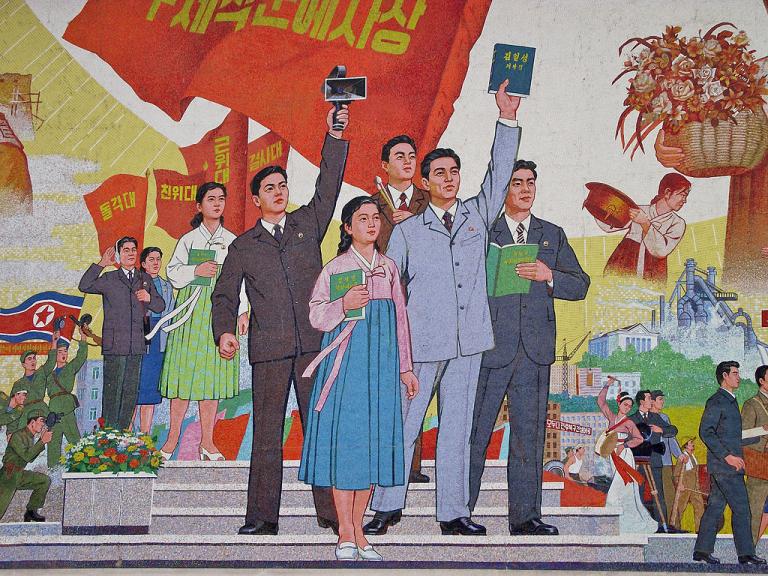One of the things Communists and Nazis agreed on was totalitarianism, the belief that the government should control the totality of human life. The People’s Republic of China is totalitarian. And the totalitarian impulse can be found in the United States.
In discussing Beto O’Rourke’s policy proposals, Kevin D. Williamson offered a useful definition of the term:
O’Rourke’s politics — and the politics of the Left more generally — are increasingly totalitarian. “Totalitarian” is not only a scary-sounding adjective. It is a word that actually means something, and what it describes is a theory of government that recognizes no sphere of truly private life, no life outside the state — one that sees the scope of the state as total, hence the term.
So is there anything outside the scope of the government in the United States? Today the government is a prime mover in the economy, decides moral issues, finances the arts, operates a vast educational system, sponsors scientific research, has a say in what you do with your private property, regulates how businesses must operate, supervises our food supply, approves what medicine we can take, and insinuates itself into other spheres of life.
And a number of our political issues today have to do with extending the reach of the government even further–taking over our health care, regulating religious beliefs and practices if they are discriminatory, controlling language with laws mandating what pronouns to use in referring to the transgendered (as some jurisdictions have already done).
Both Democrats and Republicans, liberals and conservatives and moderates, have contributed to this wide range of governmental concerns. The different political factions may argue with each other about what they think the government should do in these different spheres, but they are in tacit agreement that the sphere is the government’s responsibility.
Some of these areas may indeed represent legitimate functions of government. I’m just marveling at the wide, nearly all-inclusive scope of government today, which is far more extensive than it was just a few decades ago.
The problem is that a totalitarian approach to government is inherently flawed. A centralized government cannot micromanage a complex society effectively. Usurping the different spheres is socially dysfunctional. And totalitarianism must, by its nature, squelch its citizens’ rights and freedom.
Notice that democracies can be totalitarian. Democracies can also be authoritarian. The “tyranny of the majority” can be as brutal as that of a dictator. Democratic systems can also foster collectivism and conformity. This is why democracies need strong protections of individual rights and liberties, such as a Bill of Rights, as well as a culture that prizes individuality.
Government exists primarily to protect (not dominate) its citizens–from crime, from conquest–and, by extension, to protect (not usurp) the other social spheres they need to flourish. Governments can organize collective efforts to accomplish those ends: operating a legal system to deal with crime, maintaining a military force to defend the country, establishing marriage and inheritance laws to defend the family, building roads and other economic infrastructure to support commerce, and so on.
How far to take this protection principle and how to apply it may be debated. You could make the case that governments should intervene in the economy in order to protect its citizens’ livelihoods–even to the point of “protectionist” trade policies. You could argue that the government has a legitimate interest in protecting its citizens’ health by such means as food inspection and drug approvals–even to the point of establishing universal health care plans. Opinions will differ. But all sides must resist the totalitarian impulse. There is a difference between protecting and controlling, building up social institutions and taking their place.
I suspect some of you may be thinking, Hey, you are arguing against totalitarianism, but you are a pro-lifer! You want the government to get into people’s bedrooms and to interfere with a woman’s right to choose whether or not to have a baby! Why isn’t that totalitarian?
Well, protecting human life is the most fundamental purpose of government. I believe that a developing infant is a human being and so is entitled to the protection of the law.
Furthermore, that a child needs to be protected from his or her own parents is a sign of profound dysfunction in the institution of the family. Just as there are laws against child abuse, there should be laws against abortion. Abortion is child abuse. Abortion is anti-family.
Totalitarian governments, in their attempt to take the place of the family, tend to undermine marriage, parenthood, and traditional sexual ethics. As the totalitarian state was being constructed, the Russian Revolution sought to replace “bourgeois” families with “sexual freedom,” communal living, and communal child-raising. (Read this remarkable article in The Socialist Worker, Russia’s Sexual Revolution in 1917, which praises the way the revolution, in sweeping out the old order, legalized prostitution, homosexuality, and abortion. Eventually, though, the article complains, the old ways were brought back. We might say that human nature reasserted itself.)
In my post about how we are Importing Tyranny from Communist China, it was pointed out that I said nothing about the hypocrisy of athletes, filmmakers, tech companies, and other big corporations who are willing to condemn America, while defending China, punishing jurisdictions insufficiently woke on LGBT issues, while tolerating China’s concentration camps for Muslims, its suppression of Hong Kong, and its use of surveillance technology to control its citizens. The hypocrisy is indeed excruciating. But I perceive an underlying consistency: the impulse for totalitarianism.
Illustration: Propaganda of North Korea, photo by Mark Fahey from Sydney, Australia [CC BY 2.0 (https://creativecommons.org/licenses/by/2.0)] via Wikimedia Commons











